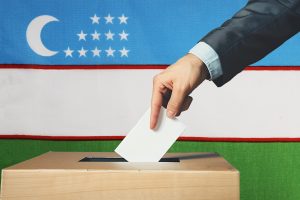As Uzbekistan gears up for its parliamentary elections, scheduled for October 27, the political landscape is buzzing with activity. With five political parties vying for seats and public sentiment riding high on hopes for reform, this election could signal a new chapter in the country’s evolving political story.
The Legislative Chamber of the Oliy Majlis has 150 seats. The upcoming election will take place under new rules, which may serve to strengthen parties by introducing proportional voting. 75 seats in the Legislative Chamber will be elected in single-mandate districts on a majority basis, as was previously the norm, while the other 75 will now be allocated on a proportional basis by party.
After the last parliamentary election in 2019, UzLiDeP (the Liberal Democratic Party of Uzbekistan) held 53 seats, Milliy Tiklanish (the National Revival Party) held 36, the Adolat Social Democratic Party held 24, the People’s Democratic Party held 22, and the Ecological Party held 15.
A recent survey conducted by the Center for Progressive Reforms offers key insights into the priorities and concerns of the electorate, shedding light on what the constituency expects from the next parliament. The survey reveals a population eager for change, particularly in areas such as transparency, economic reform, judicial independence, and environmental protection. Political parties are actively seizing these sentiments as they gear up for the election, crafting messages that resonate with a public hungry for progress.
The survey, which reached citizens through a combination of focus groups, individual interviews, and online polling, paints a picture of a nation in transition. While many respondents acknowledged the progress made under President Shavkat Mirziyoyev’s administration, they are also quick to point out where they want to see further improvements. From tackling corruption to enhancing public services, people of Uzbekistan are clear about their priorities – and the political parties are listening.
One of the most telling aspects of the survey is the growing call for increased transparency and accountability in government. This sentiment is especially strong in Tashkent, where citizens feel frustrated by infrastructure projects, such as the construction of bridges and apartment renovations, being carried out with little public input.
“We want to be part of the conversation, not just observers,” said one respondent.
It’s a clear signal to the parties: Uzbekistan’s electorate wants to be heard.
How Are the Parties Responding?
Political parties are keen on using public sentiments to further their cause, expand their electoral base, and gain traction with undecided voters.
The Adolat Social Democratic Party is doubling down on its commitment to social justice, emphasizing its role as the defender of the working class and vulnerable groups. The party has responded to calls for judicial independence and anti-corruption measures by proposing a series of reforms aimed at making the judiciary more autonomous and transparent. They are also focusing on social services and promising to address the frustrations around public infrastructure projects through greater citizen engagement.
UzLiDeP, which traditionally appeals to the business community, is pushing an agenda focused on economic liberalization and private sector development, vowing to reduce the red tape that has long stifled small and medium-sized businesses. Their message to voters is clear: fewer regulations, more opportunities. For voters, eager to see Uzbekistan integrate more deeply into the global economy, UzLiDeP is offering a path to greater economic freedom.
Milliy Tiklanish has found fertile ground regarding national identity. With many respondents expressing concern over the growing influence of foreign cultures, Milliy Tiklanish has positioned itself as the guardian of Uzbekistan’s cultural heritage. Their platform is focused on strengthening the country’s national values and promoting patriotic education. The party promises to ensure that modernization doesn’t come at the expense of Uzbekistan’s cultural soul.
The Ecological Party, with its eyes on sustainable development, has seized on the growing public awareness of environmental issues. The survey revealed widespread concern over challenges such as waste management, water shortages, and climate change. The Ecological Party is campaigning hard on a platform of environmental protection, proposing a series of green initiatives aimed at tackling these pressing issues. They are focusing on public-private partnerships to foster sustainable projects and help businesses adapt to the realities of climate change. It’s a platform that resonates particularly well with younger voters who are increasingly concerned about the planet’s future.
The People’s Democratic Party (PDP), meanwhile, is responding to calls for social welfare and economic security. With many survey respondents highlighting the need for better education and healthcare, the PDP is emphasizing its commitment to improving public services. They’ve also made poverty reduction a central plank of their campaign, proposing more robust welfare programs to ensure that no citizen is left behind.
Evolving Political Landscape
What makes this election particularly interesting is that no single issue is dominating the conversation. Instead, people are voicing a range of concerns that cut across the political spectrum. Corruption, bureaucracy, environmental protection, and national identity are all part of a broader public dialogue about what kind of future the country should have.
As the campaign season heats up, political parties are racing to prove that they have the solutions to the challenges facing the country. But they are also contending with a more engaged electorate – one that is better informed, more vocal, and less willing to accept the status quo.
With a public increasingly demanding greater transparency, accountability, and fairness, political leaders will need to rise to the occasion if they hope to maintain the momentum of reform. Whether it’s through strengthening the rule of law, enhancing social services, or tackling environmental issues, the parties will need to address the concerns of a population eager for change.
As the people head to the polls, one thing is clear: they are not just voting for the status quo, but for a better future – one where their voices matter and where the promises of reform are fulfilled. In this critical moment, Uzbekistan’s political landscape is in flux, and the country’s future remains wide open.

































